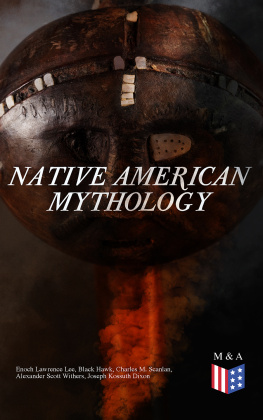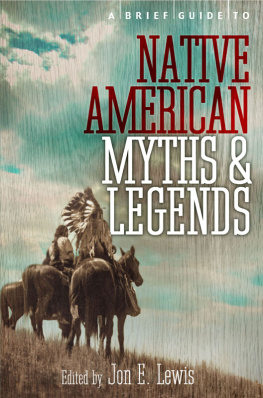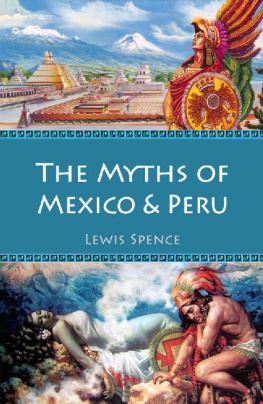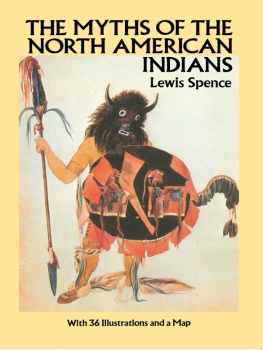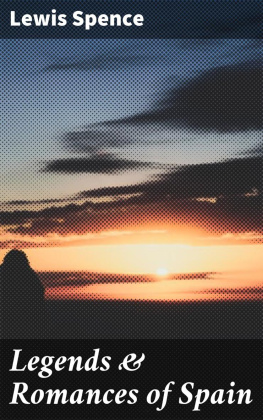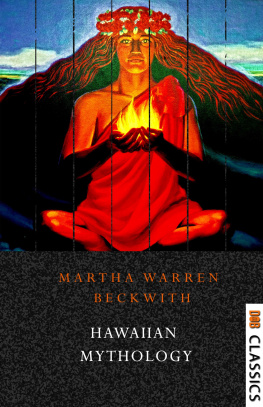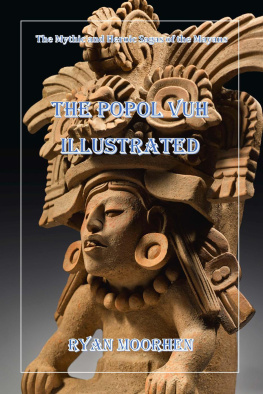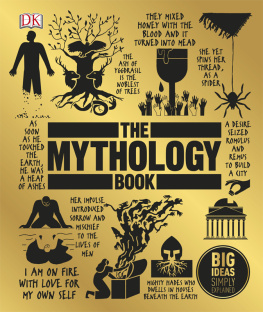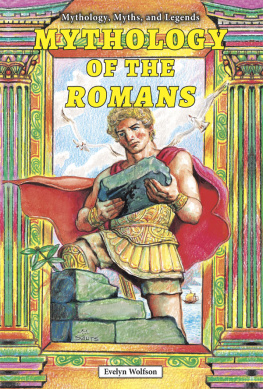THE POPOL VUH

Translated and Edited by
Lewis Spence
DOVER PUBLICATIONS, INC.
MINEOLA, NEW YORK
DOVER THRIFT EDITIONS
GENERAL EDITOR: SUSAN L. RATTINER
EDITOR OF THIS VOLUME: JANET B. KOPITO
Bibliographical Note
This Dover edition, first published in 2019, is an unabridged republication of the work published by David Nutt, London, in 1908.
International Standard Book Number
ISBN-13: 978-0-486-83664-5
ISBN-10: 0-486-83664-9
Manufactured in the United States by LSC Communications
83664901
www.doverpublications.com
2 4 6 8 10 9 7 5 3 1
2019
Contents
PREFACE
THE POPOL VUH is the New Worlds richest mythological mine. No translation of it has as yet appeared in English, and no adequate translation in any European language. It has been neglected to a certain extent because of the unthinking strictures passed upon its authenticity. That other manuscripts exist in Guatemala than the one discovered by Ximenes and transcribed by Scherzer and Brasseur de Bourbourg is probable. So thought Brinton, and the present writer shares his belief. And ere it is too late it would be well that thesethe only records of the faith of the builders of the mystic ruined and deserted cities of Central Americashould be recovered. This is not a matter that should be left to the enterprise of individuals, but one which should engage the consideration of interested governments; for what is myth to-day is often history to-morrow.
THE POPOL VUH
[The numbers in the text refer to notes at the end of the study]
THERE IS NO document of greater importance to the study of the pre-Columbian mythology of America than the Popol Vuh. It is the chief source of our knowledge of the mythology of the Kich people of Central America, and it is further of considerable comparative value when studied in conjunction with the mythology of the Nahuatlac, or Mexican peoples. This interesting text, the recovery of which forms one of the most romantic episodes in the history of American bibliography, was written by a Christianised native of Guatemala some time in the seventeenth century, and was copied in the Kich language, in which it was originally written, by a monk of the Order of Predicadores, one Francisco Ximenes, who also added a Spanish translation and scholia.
The Abb Brasseur de Bourbourg, a profound student of American archology and languages (whose euhemeristic interpretations of the Mexican myths are as worthless as the priceless materials he unearthed are valuable) deplored, in a letter to the Duc de Valmy, the supposed loss of the Popol Vuh, which he was aware had been made use of early in the nineteenth century by a certain Don Felix Cabrera. Dr. C. Scherzer, an Austrian scholar, thus made aware of its value, paid a visit to the Republic of Guatemala in 1854 or 1855, and was successful in tracing the missing manuscript in the library of the University of San Carlos in the city of Guatemala. It was afterwards ascertained that its scholiast, Ximenes, had deposited it in the library of his convent at Chichicastenango whence it passed to the San Carlos library in 1830.
Scherzer at once made a copy of the Spanish translation of the manuscript, which he published at Vienna in 1856 under the title of Las Historias del origen de los Indios de Guatemala, par el R. P. F. Francisco Ximenes. The Abb Brasseur also took a copy of the original, which he published at Paris in 1861, with the title Vuh Popol: Le Livre Sacr de Quichs, et les Mythes de lAntiquit Amricaine. In this work the Kich original and the Abbs French translation are set forth side by side. Unfortunately both the Spanish and the French translations leave much to be desired so far as their accuracy is concerned, and they are rendered of little use by reason of the misleading notes which accompany them.
The name Popol Vuh signifies Record of the Community, and its literal translation is Book of the Mat, from the Kich words pop or popol, a mat or rug of woven rushes or bark on which the entire family sat, and vuh or uuh, paper or book, from uoch to write. The Popol Vuh is an example of a world-wide genrea type of annals of which the first portion is pure mythology, which gradually shades off into pure history, evolving from the hero-myths of saga to the recital of the deeds of authentic personages. It may, in fact, be classed with the Heimskringla of Snorre, the Danish History of Saxo-Grammaticus, the Chinese History in the Five Books, the Japanese Nihongi, and, so far as its fourth book is concerned, it somewhat resembles the Pictish Chronicle.
The language in which the Popol Vuh was written was, as has been said, the Kich, a dialect of the great Maya-Kich tongue spoken at the time of the Conquest from the borders of Mexico on the north to those of the present State of Nicaragua on the south; but whereas the Mayan was spoken in Yucatan proper, and the State of Chiapas, the Kich was the tongue of the peoples of that part of Central America now occupied by the States of Guatemala, Honduras and San Salvador, where it is still used by the natives. It is totally different to the Nahuatl, the language of the peoples of Anahuac or Mexico, both as regards its origin and structure, and its affinities with other American tongues are even less distinct than those between the Slavonic and Teutonic groups. Of this tongue the Popol Vuh is practically the only monument; at all events the only work by a native of the district in which it was used. A cognate dialect, the Cakchiquel, produced the Annals of that people, otherwise known as The Book of Chilan Balam, a work purely of genealogical interest, which may be consulted in the admirable translation of the late Daniel G. Brinton.
The Kich people at the time of their discovery, which was immediately subsequent to the fall of Mexico, had in part lost that culture which was characteristic of the Mayan race, the remnants of which have excited universal wonder in the ruins of the vast desert cities of Central America ().
Such, then, were the people whose mythology produced the body of tradition and mythi-history known as the Popol Vuh; and ere we pass to a consideration of their beliefs, their gods, and their religious affinities, it will be well to summarise the three books of it which treat of these things, as fully as space will permit, using for that purpose both the French translation of Brasseur and the Spanish one of Ximenes.
Mexico, Oct. 15, 1850.
Section I, lines 58.
THE FIRST BOOK
OVER A UNIVERSE wrapped in the gloom of a dense and primeval night passed the god Hurakan, the mighty wind. He called out earth, and the solid land appeared. The chief gods took counsel; they were Hurakan, Gucumatz, the serpent covered with green feathers, and Xpiyacoc and Xmucane, the mother and father gods. As the result of their deliberations animals were created. But as yet man was not. To supply the deficiency the divine beings resolved to create mannikins carved out of wood. But these soon incurred the displeasure of the gods, who, irritated by their lack of reverence, resolved to destroy them. Then by the will of Hurakan, the Heart of Heaven, the waters were swollen, and a great flood came upon the mannikins of wood. They were drowned and a thick resin fell from heaven. The bird Xecotcovach tore out their eyes; the bird Camulatz cut off their heads; the bird Cotzbalam devoured their flesh; the bird Tecumbalam broke their bones and sinews and ground them into powder. Because they had not thought on Hurakan, therefore the face of the earth grew dark, and a pouring rain commenced, raining by day and by night. Then all sorts of beings, great and small, gathered together to abuse the men to their faces. The very household utensils and animals jeered at them, their mill-stones, their plates, their cups, their dogs, their hens. Said the dogs and hens, Very badly have you treated us, and you have bitten us. Now we bite you in turn. Said the mill-stones (metates for your sake. Now you shall feel our strength, and we will grind your flesh and make meal of your bodies. And the dogs upbraided the mannikins because they had not been fed, and tore the unhappy images with their teeth. And the cups and dishes said, Pain and misery you gave us, smoking our tops and sides, cooking us over the fire burning and hurting us as if we had no feeling. Now it is your turn, and you shall burn. Then ran the mannikins hither and thither in despair. They climbed to the roofs of the houses, but the houses crumbled under their feet; they tried to mount to the tops of the trees, but the trees hurled them from them; they sought refuge in the caverns, but the caverns closed before them. Thus was accomplished the ruin of this race, destined to be overthrown. And it is said that their posterity are the little monkeys who live in the woods.


